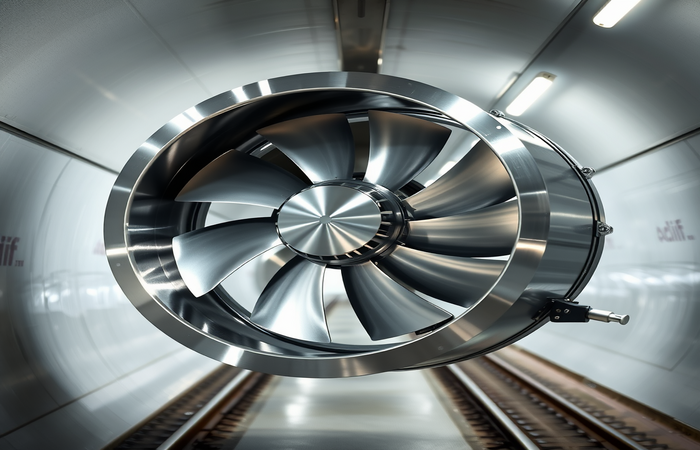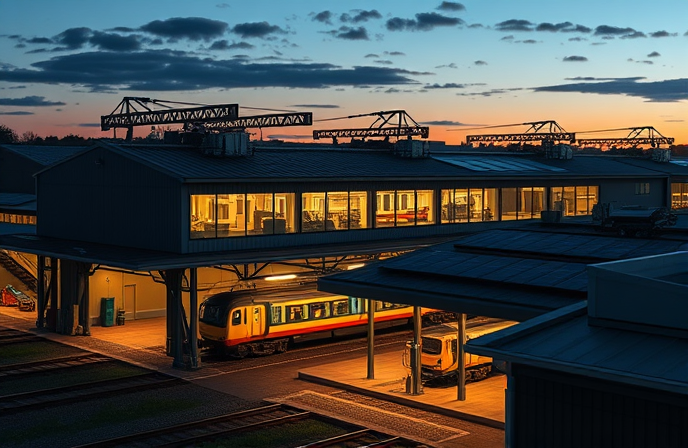Zitron Ventilation: Shaping the Future of Rail Infrastructure

Zitron’s Ventilation Systems: A Cornerstone of Modern Rail Infrastructure
The rail industry is undergoing a period of significant transformation, driven by the need for enhanced safety, sustainability, and efficiency. Central to this evolution is the critical role of advanced ventilation systems in complex environments like tunnels. This article delves into the expertise of Talleres Zitron, a global leader in providing innovative ventilation solutions for critical rail infrastructure projects. We will explore Zitron’s successful implementation of a comprehensive longitudinal ventilation system in the Pajares Tunnel, a pivotal part of the Variante de Pajares project in Spain. This achievement highlights Zitron’s capabilities in meeting stringent technical requirements, addressing the challenges of high-speed rail operations, and contributing to a more sustainable and safer rail network. We will examine the technical innovations, engineering solutions, and operational benefits that position Zitron as a key player in shaping the future of rail infrastructure.
The Engineering Marvel of the Variante de Pajares Project
The Variante de Pajares project, located in northern Spain, is a significant high-speed rail endeavor that forms part of the Trans-European Transport Network (TEN-T). This project includes the construction of one of the longest and most complex railway tunnels in Spain, spanning approximately 25 kilometers through the Cantabrian Mountains. The completion of the project significantly enhances connectivity between the regions of Asturias and Castilla y León, improving freight and passenger transport efficiency across the European Atlantic Axis. The tunnel’s construction presented unique challenges, particularly concerning ventilation due to the high-speed nature of trains and the intense “piston effect” (air displacement caused by fast-moving trains) generated during train passages. Zitron, in collaboration with Adif (Administrador de Infraestructuras Ferroviarias), successfully implemented a longitudinal ventilation solution, demonstrating their capability to meet the project’s stringent technical and performance requirements. The project is designed to be fully operational by 2026, which will replace a slower, winding route and cut travel time considerably.
Innovative Ventilation Solutions: Zitron’s Technical Prowess
Zitron’s success in the Pajares Tunnel project showcases their innovative approach to ventilation. A crucial aspect of the project was the deployment of 214 jet fans, each constructed from Stainless Steel 316L, including the impellers. This material selection was critical for superior corrosion resistance and long-term durability. Zitron’s patented stainless steel impeller is a standout feature, fully robot-welded and designed to be hollow and lightweight, reducing mechanical load and stress, thus extending the lifespan of motor bearings. These impellers are also practically indestructible, making them ideal for severe environments, such as high-speed railway tunnels, where the piston effect demands exceptional mechanical strength. The ventilation system’s capabilities include an combined airflow capacity of 1.2 million cubic metres per hour, ensuring air quality for trains reaching speeds of 300 km/h. Furthermore, the company’s robust jet fan design features fully welded support channels, specially engineered brackets for sidewall installation and a custom high-pressure valve system.
Overcoming Challenges: Installation and Adaptability
The implementation of Zitron’s ventilation system faced unique challenges, particularly the installation of fans in a tunnel with existing railway infrastructure. This required precise coordination and close collaboration with other contractors to avoid disrupting the existing rail system. Another critical challenge was maintaining the tunnel’s sealing and waterproofing membrane. To address this, Zitron designed a customized mounting system that ensured total sealing around the fan supports, preventing potential water leakage and preserving the tunnel’s integrity. The installation, completed in 2023, involved 120 engineers working in shifts to avoid track downtime, a significant logistical feat considering the tunnel’s ongoing freight traffic. The waterproofing solution, using silicone-based sealant, has proven effective in preventing leaks. This adaptability highlights Zitron’s ability to deliver high-performance ventilation systems and tailored solutions that respect the broader engineering constraints of large infrastructure projects.
The Future of Rail Ventilation: Zitron’s Position and Outlook
The successful completion of the Variante de Pajares project, including the significant economic and environmental benefits, positions Zitron as a leading player in the rail ventilation sector. The system contributes to substantial lifecycle cost savings and has reduced tunnel emissions. Safety improvements, including faster smoke clearance rates, enhance passenger confidence. Zitron is well-positioned for future projects, including the upcoming Madrid-Valencia tunnel. Future advancements, such as AI-driven fan control and carbon-fibre impellers, could further enhance system efficiency. However, challenges include rising material costs and the need for standardized EU tunnel safety codes. Zitron’s commitment to innovation, its adaptability to complex engineering challenges, and its focus on sustainability will continue to drive its success. As the rail industry focuses on decarbonization and increased efficiency, Zitron’s expertise in ventilation systems will remain crucial in ensuring the safety and effectiveness of modern rail infrastructure.
Conclusion
In conclusion, the collaboration between Zitron and Adif on the Variante de Pajares project highlights the critical importance of advanced ventilation systems in modern rail infrastructure. Zitron’s expertise in designing, supplying, and commissioning high-performance ventilation solutions has resulted in a safer, more efficient, and environmentally sustainable rail network. The successful deployment of the longitudinal ventilation system in the Pajares Tunnel demonstrates Zitron’s ability to meet stringent technical requirements and adapt to complex engineering challenges. The innovative use of stainless steel impellers and the meticulous approach to installation, including waterproofing measures, showcase Zitron’s commitment to long-term durability and reliability. The project’s contribution to reduced travel times, enhanced freight capacity, and improved air quality underscores the tangible benefits of Zitron’s technologies. Looking forward, Zitron is well-positioned to continue leading the way in rail ventilation. The company’s focus on innovation, adaptability, and sustainability, alongside advancements like AI-driven fan control and carbon-fibre impellers, will be pivotal in shaping the future of rail infrastructure. Despite challenges like rising material costs, Zitron’s success in the Variante de Pajares project firmly establishes its position as a key partner in the global transition toward safer, more efficient, and sustainable rail transport.
This article was written on June 14, 2024
Company Summary:
- Talleres Zitron: A Spanish company founded in 1962, specializing in ventilation systems for critical rail infrastructure projects globally. They are known for their expertise in design, supply, and commissioning of advanced ventilation solutions, with notable projects like the Pajares Tunnel in Spain, showcasing innovative technologies like stainless steel impellers and robust jet fan designs.
- Adif: (Administrador de Infraestructuras Ferroviarias) is Spain’s rail infrastructure manager, responsible for the development and maintenance of the Spanish railway network. They collaborated with Zitron on the Variante de Pajares project, a key high-speed rail initiative.





